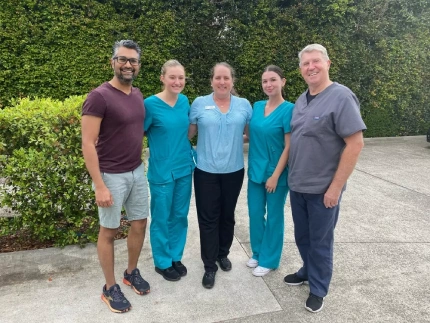
Dentist Sippy Downs
Our clinic has been delivering trusted
dental services for over 20 years.



Enjoy Tailored Family Dental Services at The Smile Workx
At The Smile Workx, our priority is providing gentle and extensive dental care to every patient.
Our dedicated approach ensures a comfortable and comprehensive dental experience for all.
Located at 48 Mary Street, Noosaville, our facility features ample off-street parking and full wheelchair access, ensuring convenience and accessibility for everyone.
Our services encompass a broad spectrum, from preventative maintenance to complex dental procedures, ensuring that we cater to the complete dental needs of your family.
We have crafted an environment focused on patient comfort, aiming to make every visit as calm and stress-free as possible.
Our Special Offers

Check-up & Clean $62.25/week* or $249
⚫ Scale & Clean
⚫ Gum Health Assessment
⚫ Refreshing Fluoride
⚫ New patient hygiene gift
⚫ New patients Only
Health fund rebates available!
⚫ All x-rays included

Kids Specials $0 out of pocket
⚫ GAP FREE for Under 14 years old, health fund members
⚫ Comprehensive Exam and Consultation
⚫ Scale & Clean with X Rays
⚫ Gum Health Assessment
⚫ Refreshing Fluoride

Dental Implants $35/week*
⚫ Complimentary Consultation (Savings of $55)
⚫ Celebratory post treatment gift: Water Air Flosser (valued at $99)
⚫ New Patient Hygiene Gift
⚫ Flexible payment plans

Orthodontics $83/week*
⚫ Complimentary Smile Consultation
⚫ Bonus gift: Custom retainers (valued at $500)
⚫ Celebratory Gift: Professional Whitening Kit (savings of $460)
⚫ New Patient Hygiene Kit

Smile Makeover Package $87.50*/week
⚫ High Quality-Natural Looking Veneers
⚫ Celebratory Post Treatment Gift - Professional Smile Portraits
⚫ New Patient Hygiene Gift

Custom Sports Mouthguards GAP-FREE or $100
⚫ Highly Durable and Comfortable
⚫ Pick your child’s favourite colour!

Check-up & Clean $62.25/week* or $249
⚫ Scale & Clean
⚫ Gum Health Assessment
⚫ Refreshing Fluoride
⚫ New patient hygiene gift
⚫ New patients Only
Health fund rebates available!
⚫ All x-rays included

Kids Specials $0 out of pocket
⚫ GAP FREE for Under 14 years old, health fund members
⚫ Comprehensive Exam and Consultation
⚫ Scale & Clean with X Rays
⚫ Gum Health Assessment
⚫ Refreshing Fluoride

Dental Implants $35/week*
⚫ Complimentary Consultation (Savings of $55)
⚫ Celebratory post treatment gift: Water Air Flosser (valued at $99)
⚫ New Patient Hygiene Gift
⚫ Flexible payment plans

Orthodontics $83/week*
⚫ Complimentary Smile Consultation
⚫ Bonus gift: Custom retainers (valued at $500)
⚫ Celebratory Gift: Professional Whitening Kit (savings of $460)
⚫ New Patient Hygiene Kit

Smile Makeover Package $87.50*/week
⚫ High Quality-Natural Looking Veneers
⚫ Celebratory Post Treatment Gift - Professional Smile Portraits
⚫ New Patient Hygiene Gift

Custom Sports Mouthguards GAP-FREE or $100
⚫ Highly Durable and Comfortable
⚫ Pick your child’s favourite colour!
Why Choose Us?
Opting for our dental services means entrusting your oral care to a team dedicated to delivering exceptional, attentive dental services. Our experienced and gentle staff are passionate about helping every patient attain a radiant, healthy smile through personalised and compassionate care.
In Noosaville, our practice stands out for our commitment to high-standard dental care provided in a serene and stress-free setting. This approach has fostered long-lasting relationships with our patients, many of whom have been returning to us for years for their dental needs.
We accommodate a diverse range of dental requirements, from the initial check-up of a young child to the complex dental needs of adults.
Our services are meticulously tailored to each individual’s specific circumstances, ensuring that every treatment plan is as unique as the patient receiving it.
Choose The Smile Workx for quality dental care
You can trust our skill in addressing unique dental problems for families.
- Affordable, integrated, and comprehensive dental care solutions
- Cosy, family-friendly environment for all ages
- Cutting-edge dental technologies and innovative procedures
- Highly professional dental experts
- A diverse range of dental healthcare options
- Payment schemes designed for financial flexibility
- Bulk billing for children
- Accredited associates of BUPA, HCF, NIB, and WestFund
- Rapid assistance for emergency dental needs
- Individually customised appointment scheduling
- Superior cosmetic dentistry treatments available
For more information on dental treatments and appointments, schedule an appointment with us at (07) 5300 2133.







Payment Plans Available
What Our Customers Say
Frequently Asked Questions
What are dental implants?
Dental implants are a revolutionary advancement in the field of dentistry, offering a permanent solution for missing teeth. Unlike traditional dentures or bridges, dental implants serve as a substitute for tooth roots, providing a strong foundation for fixed or removable artificial teeth. This dental treatment not only enhances the aesthetic appearance but also significantly improves oral health.
The Importance of Dental Implants
Dental implants are vital for individuals who have lost one or more teeth due to decay, periodontal disease, or injury. Missing teeth can lead to various oral health problems, including jawbone deterioration, shifted teeth, and altered facial structure. By replacing the tooth root, implants maintain the integrity of the jawbone and prevent further dental issues, ensuring the longevity of oral health.
The Dental Implant Process
The process of getting dental implants involves several steps and requires multiple visits to the dental practice. Initially, a thorough examination, including X-rays and possibly CT scans, is conducted to assess the condition of the jawbone and plan the implant procedure. If the jawbone is not robust enough to support the implant, bone grafting might be necessary.
Once the jawbone is prepared, or if no grafting is needed, the implantation procedure begins. Under local anaesthesia, the dentist surgically places the titanium implant into the jawbone. This phase requires patience, as the implant must fuse with the bone, a process known as osseointegration, which can take several months.
After osseointegration is complete, the dentist attaches an abutment to the implant, which will hold the new tooth. Finally, a custom-made crown, designed to match the natural teeth, is attached to the dental abutment, completing the restoration.
Advantages of Dental Implants
Tooth implants offer many benefits over other forms of dental treatments for missing teeth. They provide a natural feel and appearance, allowing for normal eating, speaking, and smiling. Implants are also durable, with the potential to last a lifetime with proper care. Furthermore, they help preserve the natural structure of the surrounding teeth and prevent bone loss, contributing to overall oral health.
Caring for Dental Implants
The success of dental implants greatly depends on proper care and maintenance. Regular brushing, flossing, and dental check-ups are essential to prevent infections and ensure the longevity of the implants. It’s important to treat them as you would your natural teeth, avoiding hard foods that might damage the crown or implant.
What steps should be followed to ensure optimal teeth and gum care?
Maintaining optimal teeth and gum care is crucial for overall oral health, preventing a range of dental issues such as cavities, gingivitis, and periodontitis. A comprehensive oral hygiene routine not only keeps your mouth healthy but also contributes to your general well-being. Below are essential steps recommended by dental professionals for maintaining optimal teeth and gum health.
Regular Brushing
Brushing your teeth at least twice a day, in the morning and before bedtime, is fundamental. Use fluoride toothpaste and a soft-bristled toothbrush to gently clean all surfaces of your teeth and along the gum line. Brushing helps remove plaque, a sticky film of bacteria that forms on teeth and gums, preventing tooth decay and gum disease.
Flossing Daily
Flossing once a day is essential to remove food particles and plaque from between the teeth and under the gumline, areas where a toothbrush can’t reach. Regular flossing helps prevent gum disease and tooth decay. Use about 45 cm of floss, winding most around one finger and a small amount around the opposite finger; gently guide the floss between teeth with a rubbing motion.
Use of Mouthwash
Incorporating an antiseptic or fluoride mouthwash into your daily routine can help reduce bacterial plaque, prevent or reduce gingivitis, and decrease the rate of tartar formation. Mouthwash should not replace brushing or flossing but can be an additional tool to help maintain oral health.
Maintaining a Balanced Diet
Eating a balanced diet that is low in sugary snacks and beverages contributes significantly to oral health. Nutrient-rich foods from all food groups promote healthy teeth and gums. Moreover, chewing fibrous vegetables and fruits stimulates saliva flow, which is a natural defence against cavities and gum disease.
Regular Dental Check-ups
Visiting your dental practice for regular check-ups and cleanings is crucial. A dentist can remove plaque and tartar that can’t be brushed or flossed away. Regular visits allow for early detection and treatment of oral health issues before they become more serious.
Quitting Smoking
Smoking or using other tobacco products can harm your gums, leading to gum disease or, worse, oral cancer. Quitting smoking can help improve your oral health significantly and reduce the risk of dental problems.
Drinking Plenty of Water
Water is the best beverage for maintaining oral health. It helps wash away food particles and residues that cavity-causing bacteria feast on. Fluoridated water can also help prevent tooth decay.
Limiting Alcohol Consumption
Excessive alcohol consumption can dehydrate the mouth, making you more susceptible to gum disease and tooth decay. Limiting alcohol intake and maintaining a healthy flow of saliva are important for oral health.
What is general dentistry?
General dentistry encompasses a broad range of services aimed at promoting and maintaining dental health. This field covers routine dental treatments such as cleanings, fillings, root canals, and preventative care to ensure the long-term health of patients’ teeth and gums. General dentists play a crucial role in diagnosing and treating oral health issues before they become serious, providing comprehensive care that maintains the overall well-being of patients.
What is the process for teeth whitening?
Teeth whitening is a popular dental treatment aimed at lightening the natural colour of your teeth without removing any of the tooth surfaces. It can significantly enhance the brightness and appearance of your smile.
Consultation and Assessment
The process begins with a consultation at our dental practice, where our dentist will assess your oral health to ensure you are a suitable candidate for teeth whitening. This step is crucial to identify any oral health issues that need to be addressed before the whitening procedure.
Preparation
Before the actual whitening process, professional cleaning is often recommended to remove surface stains and plaque. This preparation ensures that the whitening product has the best possible surface to work on.
The Whitening Procedure
Using advanced dental technology, the dentist will apply a whitening agent to your teeth. This can vary from a gel activated by a special light to custom-made, take-home trays designed for your teeth. The method chosen will depend on your specific needs and the level of whitening desired.
Aftercare
Post-treatment, you will receive guidance on how to maintain your newly whitened teeth. This might include avoiding staining foods and drinks for a short period and following a particular oral hygiene routine.
When is the clinic open?
Our dental clinic is committed to providing exceptional dental care for the whole family, catering to all your dental needs in a happy dental environment. Our highly trained professional dentists are available from Monday to Thursday, 07:30 AM to 04:00 PM, and on Friday, 07:30 AM to 04:00 PM. On Saturdays, we offer emergency appointments to ensure that you have access to care when it’s most needed. Trust us to deliver excellent dental services for you and your loved ones.
Do you provide sedation options for anxious patients?
Yes, for anxious patients or those requiring family dentistry services, our clinic offers sleep dentistry options, including the use of happy gas, to reduce anxiety during dental procedures. This ensures a more comfortable and stress-free experience for all members of your family during their dental treatments.
What are dental veneers?
Custom-designed thin shells, known as dental veneers, are used to improve the appearance of teeth by covering their front surface.
What is the recommended age for a child’s initial dental examination?
Children should ideally have their first dental visit by the time they turn 12 months old, as this is crucial for assessing their oral development and establishing a foundation for healthy dental practices. This early visit helps in identifying any potential issues with your child’s oral health and sets the stage for lifelong dental care habits. It also allows the dentist to provide parents with essential guidance on how to care for their child’s teeth and gums effectively. Introducing children to dental care at a young age can help minimise dental anxiety and promote positive attitudes towards oral hygiene.
Note: Any surgical or invasive procedure carries risks. Before proceeding, you should seek a second opinion from an appropriately qualified health practitioner.













